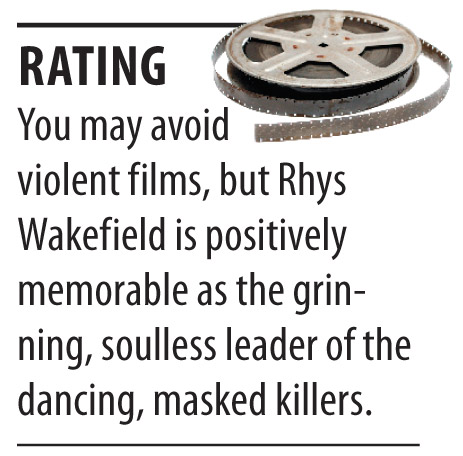Subscriber Benefit
As a subscriber you can listen to articles at work, in the car, or while you work out. Subscribe Now
 The East
The East
“The East” is one of those wonderful films that you should not let escape the theater. While it won’t appeal to everyone, it is a powerful film that embodies the memorable words of Peter Finch in his Oscar-winning performance in “Network” (1976), when he stated, “I’m mad as hell and I’m not going to take it any more!”
Director Zal Batmanglij’s movie focuses on an intriguing group of domestic terrorists dedicated to holding American corporations accountable for their profound excesses. For example, one of their public mottos is, “You poison us, we’ll poison you.”
You come to admire them despite the
fact that they freely violate the law. How can you not embrace this cluster of rogues who simply want to ensure that industrial companies that pollute our rivers and streams pay for their public sins? Can it really be kidnapping to force the CEO of an oil refinery that has been secretly dumping hazardous wastewater – threatening the health of working people living nearby – to literally swim in their polluted waters?
In an attempt to infiltrate our anarchist group, an intelligence firm headed by the cryptic Patricia Clarkson sends an operative played by Brit Marling to work undercover. Marling’s operative is tremendous as a young woman whose initial condemnation of the group mutates as she begins to identify with its members. Her confusion deepens with her personal attraction to the head of the group, a young man powerfully played by Alexander Skarsgard. Far from a self-righteous thug, he is dedicated to risking his life for the cause.
Also standing out is Toby Kebbell, playing a former doctor who is physically and emotionally scarred from the hidden side-effects of a popular pharmaceutical drug. For him, it is time to settle a score with the leaders of the responsible drug company in one of the most searing sequences of the film.
But it is the performance of Ellen Page that reaches up and grabs you by the throat. Playing a young woman known as Izzy, she memorably fights to get even with her wealthy father, leading to profound tragedy. If you doubt Ms. Page’s talents, think of her as the girl with the bad attitude in “Hard Candy” (2000); the nasty little Kitty Pryde in “X-Men: The Last Stand” (2006); her knockout role as the pregnant young girl in “Juno” (2007); the kick-ass rollerblader in “Whip It” (2009); her contribution to the great success of “Inception” (2010), and her endearing portrayal of the foolish fake super hero known as Boltie in “Super” (2010). This native of Halifax, Nova Scotia, is a human work of art.
Finally, 2013 has brought us a series of interesting films that are co-written by actresses who then appear on screen. Much like Greta Gerwig did in the delightful “Frances Ha” and Julie Delpy again accomplished in “Before Midnight,” Ms. Marling breathes life into her own script. These women have helped to create stories that give an exciting, edgy nuance to their gender, and movie audiences benefit as a result.
The Purge
“The Purge” is a slashing exposé of political thought in this country masquerading as a futuristic sci-fi/horror film. In what appears to be a rehash of prior films involving a family under siege in their own home, writer/director James DeMonaco lays waste to Tea Party proponents and their conservative acolytes. It’s a human recreation of George Orwell’s “Animal Farm” (1945).
As everyone knows, the daily mantra heard in the House of Representatives in Washington as well as on Fox News is the need to cut the national deficit. While supporters embrace using taxpayer money to remodel luxury suites at the Colts’ Lucas Oil Stadium, they cry out to reduce Social Security and Medicare payments to our aging population. They won’t dare allow any reasonable changes in our gun laws, but they embrace slashing food stamps for our hungry children.
What Mr. DeMonaco has done with “The Purge” is create a future America in 2022 that embodies the Tea Party philosophy to the extreme. Modern day Founding Fathers are applauded for reducing crime and public expenditure by creating a 12-hour period every year in March when no laws apply to anything. In other words, from 7 p.m. to 7 a.m., you can kill, maim and rob at your leisure.
On the surface, the film involves the family of home security salesman James Sandin who pay the price for kindness. Though they and other well-to-do Americans are able to secure their property in a fashion that makes them nearly completely safe, Mr. Sandin’s son permits a besieged black man to enter their home to avoid impending death. The question concerns whether the stranger truly is in dire need, or was he simply using a ruse to kill the family?

Ethan Hawke and Lena Headey play the Sandins, and they do a superb job of embracing the consequences of a society that has turned upside down. They soon find their house under siege by a group of intriguing killers who only want the wealthy Sandins to turn over their seemingly homeless refugee or pay the consequences.
What follows is a ghastly ordeal for the Sandins. In effect, what “The Purge” represents is the United States twisting the Tea Party’s demand to reduce food stamp payments by simply killing the poor and unemployed.
The public and news media are seen praising a country for recognizing the need to eliminate the homeless begging on every street corner when not in prison, not to mention constantly living on the public dole. Since none of them have the financial means to secure their safety during the purge, why not wipe out as many as possible during a 12-hour period every year?
In “The Purge” we see the results of a horrific national policy that reduces the need to care for the poor, the elderly and the dispossessed. If the government doesn’t care if they suffer, why worry if they die?
The problem for the Sandins becomes a problem for all of us. If you try to act in the name of heaven, don’t you then become as expendable as those desperate people on the run?•
__________
Robert Hammerle practices criminal law in Indianapolis. When he is not in the courtroom or working diligently in his Pennsylvania Street office, Bob can likely be found at one of his favorite movie theaters watching and preparing to review the latest films. To read more of his reviews, visit www.bigmouthbobs.com. The opinions expressed are those of the author.
Please enable JavaScript to view this content.
